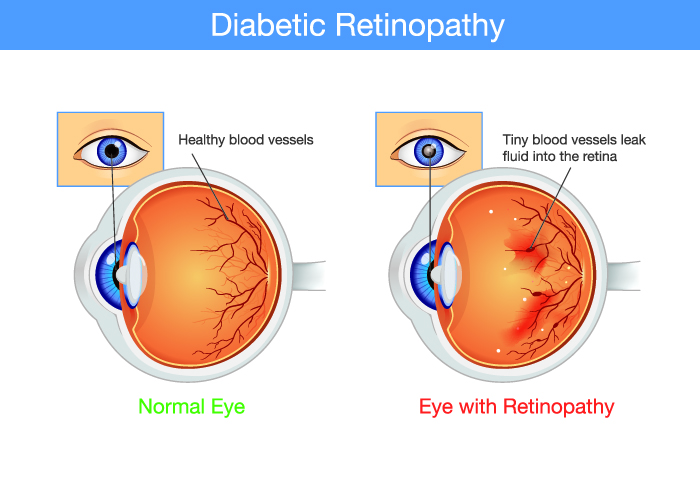Diabetic Retinopathy Treatment in MRC Nagar, Chennai
Diabetic retinopathy is one of the severe complications of diabetes that can affect both the eyes. If left untreated, it may damage the retina and lead to vision loss. As this condition has certain risks and is asymptomatic at early stages, diabetic retinopathy specialists suggest that people with diabetes should frequently get an eye examination to prevent complications. For examination, visit any diabetic retinopathy hospital in Chennai.

What causes diabetic retinopathy?
Diabetic retinopathy develops when there are high levels of sugar in your blood. It gradually damages the blood vessels in the retina. When the blood sugar impedes the blood vessels, it can leak fluids and blood, resulting in cloudy and blurry vision. Diabetic retinopathy doctors often say that people who can control their blood sugar level have slow onset and progression of the disease.
What are the symptoms of diabetic retinopathy?
Non-proliferative diabetic retinopathy is the early stage of the diabetic disease with mild or no symptoms. There is leakage of fluids and lipids from abnormal blood vessels into the central retina. This leakage may lead to macular edema.
Proliferative diabetic retinopathy: It is an advanced stage of diabetic disease. At this stage, new, fragile blood vessels can grow in the retina and into the vitreous, leaking blood back into the eye. You may experience symptoms like difficulty seeing at night or distinguishing colors, blurred vision, having dark spots or floaters in your vision and complete vision loss.
What are the risk factors for diabetic retinopathy?
- People with type 1 or type 2 diabetes are at higher risk.
- Other conditions like high blood pressure or high cholesterol may increase your risk of diabetic retinopathy.
- Pregnant women and people with a family history of diabetes are more prone to the disease.
- Alternatively, it may affect people who smoke regularly or use tobacco.
When do you need to see a doctor?
Management of diabetes can help you lower the risk of diabetic retinopathy. However, if you are diabetic or pregnant or observe any sudden changes in your vision, visit the best diabetic retinopathy hospital in Chennai to prevent complications.
Request an appointment at Apollo Spectra Hospitals, MRC Nagar, Chennai.
Call 1860 500 2244 to book an appointment.
Get diagnosed with a comprehensive dilated eye exam frequently. In this exam, eye drops are given to widen the pupils and observe the leakage, scarring and swelling of the blood vessels. Apart from that, diabetic retinopathy specialists may perform a fluorescein angiography test to evaluate abnormal blood vessel growth and an optical coherence tomography to examine the retina.
How is diabetic retinopathy treated?
In the early stages of non-proliferative diabetic retinopathy, management of sugar levels is the only option. For this, you can consult your endocrinologist (diabetes doctor) to control the condition.
Request an appointment at Apollo Spectra Hospitals, MRC Nagar, Chennai.
Call 1860 500 2244 to book an appointment.
For advanced stages, treatment options include:
Focal laser treatment or photocoagulation: It focuses on treating blurred vision from macular edema. It may not completely treat the loss, but it stops further deterioration.
Scatter laser treatment: Also called pan-retinal photocoagulation, it is used to stop the leakage of blood and fluid into the retina. In this procedure, the retina is treated with laser burns to seal the leaks.
Injections to the eye: They are called vascular endothelial growth factor inhibitors and are injected into the vitreous to stop the formation of abnormal blood vessels and regulate fluid buildup.
Vitrectomy: The procedure involves removing the scar tissue and removing fluid or blood from the vitreous.
How can you prevent diabetic retinopathy?
If you have diabetes, you can stop the progression of diabetic retinopathy by following specific preventive measures such as:
- Proper diet and regular exercise
- Controlling high blood sugar levels and high blood pressure
- Avoiding alcohol and smoking
- Intake of low saturated fats and cholesterol or using statins for controlling cholesterol
Conclusion
Diabetic retinopathy is a severe sight-threatening condition for those who are diagnosed with diabetes. Maintaining a low-glycemic diet can stop the progression. Consulting an ophthalmologist near you for regular eye exams or visiting any diabetic retinopathy hospital in Chennai can help diagnose the condition at early stages.
Diabetic people who have mild-to-moderate symptoms of retinopathy can go for cataract surgery. Otherwise, before going for cataract surgery, you should have undergone treatment for advanced diabetic retinopathy.
Yes, it is possible to have two or more separate pupils in the eye, usually called polycoria. People with diabetes may also develop cataracts or glaucoma apart from retinopathy.
Typically, diabetic patients develop this condition after they have diabetes for 3-5 years. It can cause vision loss if left untreated, and it takes several years to reach this stage.
Symptoms
Our Doctors
DR. M SOUNDARAM
MBBS, MS, FCAEH...
| Experience | : | 8 Yeras Experience |
|---|---|---|
| Speciality | : | Ophthalmology... | Location | : | Alwarpet |
| Timings | : | Available by prior a... |
DR. UMA RAMESH
MBBS, DOMS, FRCS...
| Experience | : | 33 Yeras Experience |
|---|---|---|
| Speciality | : | Ophthalmology... | Location | : | Alwarpet |
| Timings | : | Sat : 12:00 PM to 1:... |
DR. MANOJ SUBHASH KHATRI
MBBS, DO, DNB, FICO(...
| Experience | : | 15 Yeras Experience |
|---|---|---|
| Speciality | : | Ophthalmology... | Location | : | Alwarpet |
| Timings | : | Available by prior a... |
DR. SRIPRIYA SANKAR
MBBS, Madras Medical...
| Experience | : | 30 Yeras Experience |
|---|---|---|
| Speciality | : | Ophthalmology... | Location | : | Alwarpet |
| Timings | : | Tue, Thur: 05:00 PM ... |
DR. PRATIK RANJAN SEN
MBBS, MS, DO...
| Experience | : | 23 Yeras Experience |
|---|---|---|
| Speciality | : | Ophthalmology... | Location | : | Alwarpet |
| Timings | : | ON CALL... |
DR. MEENAKSHI PANDE
MBBS, DO, FRCS...
| Experience | : | 27 Yeras Experience |
|---|---|---|
| Speciality | : | Ophthalmology... | Location | : | Alwarpet |
| Timings | : | Available on prior a... |
DR. ASHOK RANGARAJAN
MBBS, MS (OPHTHAL), ...
| Experience | : | 20 Yeras Experience |
|---|---|---|
| Speciality | : | Ophthalmology... | Location | : | Alwarpet |
| Timings | : | Mon, Wed, Fri : 6:00... |
DR. SAPNA K MARDI
MBBS, DNB (Opthal)...
| Experience | : | 30 Yeras Experience |
|---|---|---|
| Speciality | : | Ophthalmology... | Location | : | Alwarpet |
| Timings | : | Tue, Thur : 10:00 AM... |
DR. SRIKANTH RAMASUBRAMANIAN
MBBS, MS (Ophthal), ...
| Experience | : | 14 Yeras Experience |
|---|---|---|
| Speciality | : | Ophthalmology... | Location | : | Alwarpet |
| Timings | : | Mon, Wed, Fri | 10... |
Our Top Specialities
NOTICE BOARD
CONTACT US
CONTACT US
 Book Appointment
Book Appointment











.svg)
.svg)
.svg)
.svg)








